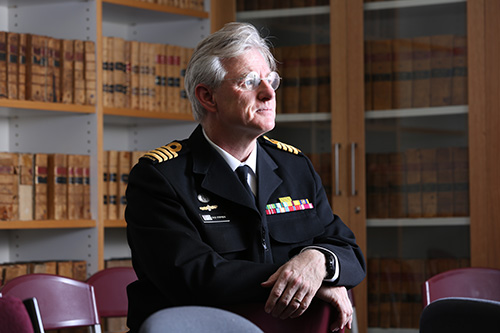Faculty armed to meet increase in demand

Associate Professor Dale Stephens CSM
When Associate Professor Dale Stephens CSM commenced his teaching role with the University of Adelaide's Law School in early 2013, he had no notion of just how popular his courses would turn out to be. Associate Professor Stephens teaches courses in international law, national security law and military law. He will soon increase his program to cater to overwhelming demand. last year, 24 students undertook Associate Professor Stephens' international humanitarian law course. After being asked to increase student numbers for this year, Associate Professor Stephens raised available spaces to 100. Within six minutes, enrolments were full. Interest in his other courses has been equally impressive. Part of the surge in demand has stemmed from the School winning the contract to train Australian Defence Force (ADF) lawyers in advanced areas of military law, in conjunction with the Australian national University (AnU). In addition to fundamental training in operations, administrative and criminal law, the University of Adelaide and AnU plan to offer an increasing number of electives to students both from within the military and outside of it. "Next year, the University of Adelaide's law School will launch a new research unit on military law and ethics, to enable students to focus on their areas of interest," advised Associate Professor Stephens. "From cyber warfare and autonomous weapon systems to strategic space law and humanitarian protection in armed conflict, the areas of research interest are endless." Associate Professor Stephens said that the rising interest in military law comes partly as a result of the ADF's constant activity over the last 20 years, and the fact that corresponding law that applies to operations has grown exponentially over that time. In fact, he states that law saturates the modern battle space. "With signing and ratifying treaties, Australia has become bound by a significant amount of treaty law as well as corresponding customary international law," he explained. "Equally there has been a number of domestic legal frameworks created that reflect and implement this international law, or that have otherwise been developed that apply to military operations. "People are beginning to understand the significance of law in restraining violence and shaping outcomes, and want to learn more." Associate Professor Stephens is looking forward to the opportunities that come with increased demand for his courses. Reflecting on his 20 years of previous military service, Associate Professor Stephens says that there have been many legal, moral and ethical issues encountered in the conduct of operations. "Having the capacity to explore and research these issues more deeply at the University of Adelaide is a wonderful opportunity," he said. "It's also very encouraging to have lots of very impressive young minds who are keen to ask the same questions that I've been asking for a long time."
|




